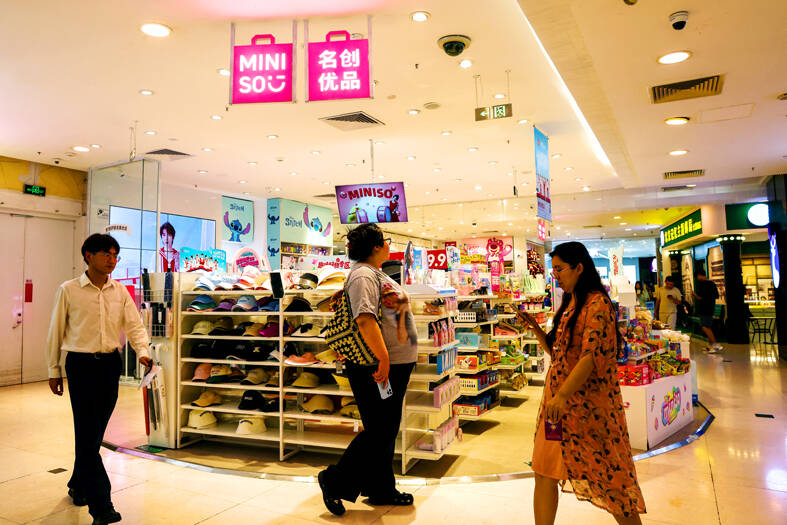US President Donald Trump on Monday ordered a delay in the reimposition of higher tariffs on Chinese goods, hours before a trade truce between Washington and Beijing was due to expire.
The White House’s halt on steeper tariffs would be in place until Nov. 10.
“I have just signed an Executive Order that will extend the Tariff Suspension on China for another 90 days,” Trump wrote on Truth Social.

Photo: EPA
While the US and China slapped escalating tariffs on each other’s products this year, bringing them to prohibitive triple-digit levels and snarling trade, both countries in May agreed to temporarily lower them.
Their 90-day halt of steeper levies had been due to expire yesterday.
At about the same time that Trump confirmed the new extension, Xinhua news agency published a joint statement from US-China talks in Stockholm saying that Beijing would also extend its side of the truce.
China would continue suspending its earlier tariff hike for 90 days starting yesterday while retaining a 10 percent duty, the report said.
It would also “take or maintain necessary measures to suspend or remove non-tariff countermeasures against the United States, as agreed in the Geneva joint declaration,” Xinhua reported.
In the executive order posted yesterday to its Web site, the White House reiterated its position that there are “large and persistent annual US goods trade deficits,” and they “constitute an unusual and extraordinary threat to the national security and economy of the United States.”
The order acknowledged Washington’s ongoing discussions with Beijing “to address the lack of trade reciprocity in our economic relationship” and added that China has continued to “take significant steps toward remedying” the US complaints.
“Beijing will be happy to keep the US-China negotiation going, but it is unlikely to make concessions,” said William Yang, an analyst at the International Crisis Group.
China sees its leverage over rare earth exports as a strong one and Beijing is likely to use it to pressure Washington, Yang said.
US-China Business Council president Sean Stein said that the latest extension is “critical to give the two governments time to negotiate an agreement” providing much-needed certainty for companies to make plans.
A trade deal, in turn, would “pave the way for a Trump-
[Chinese President] Xi [Jinping, 習近平] summit this fall,” Asia Society Policy Institute senior vice president Wendy Cutler said.
However, Cutler, herself a former US trade official, said: “This will be far from a walk in the park.”
Even as both countries reached a pact to cool tensions after high-level talks in Geneva, Switzerland, in May, the de-escalation has been shaky.
Key economic officials convened in London in June as disagreements emerged and US officials accused their counterparts of contravening the pact. Policymakers met again in Stockholm last month.
Trump said on social media on Sunday that he hoped China would “quickly quadruple its soybean orders,” adding that this would be a way to balance trade with the US.
As part of their May truce, fresh US tariffs targeting China were reduced to 30 percent and the corresponding level from China was cut to 10 percent.

Shares in Taiwan closed at a new high yesterday, the first trading day of the new year, as contract chipmaker Taiwan Semiconductor Manufacturing Co (TSMC, 台積電) continued to break records amid an artificial intelligence (AI) boom, dealers said. The TAIEX closed up 386.21 points, or 1.33 percent, at 29,349.81, with turnover totaling NT$648.844 billion (US$20.65 billion). “Judging from a stronger Taiwan dollar against the US dollar, I think foreign institutional investors returned from the holidays and brought funds into the local market,” Concord Securities Co (康和證券) analyst Kerry Huang (黃志祺) said. “Foreign investors just rebuilt their positions with TSMC as their top target,

H200 CHIPS: A source said that Nvidia has asked the Taiwanese company to begin production of additional chips and work is expected to start in the second quarter Nvidia Corp is scrambling to meet demand for its H200 artificial intelligence (AI) chips from Chinese technology companies and has approached contract manufacturer Taiwan Semiconductor Manufacturing Co (TSMC, 台積電) to ramp up production, sources said. Chinese technology companies have placed orders for more than 2 million H200 chips for this year, while Nvidia holds just 700,000 units in stock, two of the people said. The exact additional volume Nvidia intends to order from TSMC remains unclear, they said. A third source said that Nvidia has asked TSMC to begin production of the additional chips and work is expected to start in the second

REVENUE PERFORMANCE: Cloud and network products, and electronic components saw strong increases, while smart consumer electronics and computing products fell Hon Hai Precision Industry Co (鴻海精密) yesterday posted 26.51 percent quarterly growth in revenue for last quarter to NT$2.6 trillion (US$82.44 billion), the strongest on record for the period and above expectations, but the company forecast a slight revenue dip this quarter due to seasonal factors. On an annual basis, revenue last quarter grew 22.07 percent, the company said. Analysts on average estimated about NT$2.4 trillion increase. Hon Hai, which assembles servers for Nvidia Corp and iPhones for Apple Inc, is expanding its capacity in the US, adding artificial intelligence (AI) server production in Wisconsin and Texas, where it operates established campuses. This

Garment maker Makalot Industrial Co (聚陽) yesterday reported lower-than-expected fourth-quarter revenue of NT$7.93 billion (US$251.44 million), down 9.48 percent from NT$8.76 billion a year earlier. On a quarterly basis, revenue fell 10.83 percent from NT$8.89 billion, company data showed. The figure was also lower than market expectations of NT$8.05 billion, according to data compiled by Yuanta Securities Investment and Consulting Co (元大投顧), which had projected NT$8.22 billion. Makalot’s revenue this quarter would likely increase by a mid-teens percentage as the industry is entering its high season, Yuanta said. Overall, Makalot’s revenue last year totaled NT$34.43 billion, down 3.08 percent from its record NT$35.52